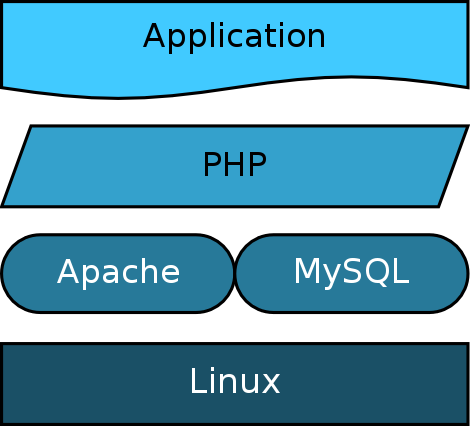 e foundation. Teamed up with MySQL, the server scape was slowly assimilated. The Desktop was young with Slackware, Debian, Redhat, Mandrake making early in-roads. Few saw Linux as a solution for the desktop where usability translated to simplicity. Hackers (programmers), sysadmins adopted GNU/Linux in whatever form it was available. At the same time, IBM was demonstrating Linux on its mainframes and packing it onto a wristwatch. They had proven that it was practically scalable. The impact at that time was subtle, but a revolution had begun.
e foundation. Teamed up with MySQL, the server scape was slowly assimilated. The Desktop was young with Slackware, Debian, Redhat, Mandrake making early in-roads. Few saw Linux as a solution for the desktop where usability translated to simplicity. Hackers (programmers), sysadmins adopted GNU/Linux in whatever form it was available. At the same time, IBM was demonstrating Linux on its mainframes and packing it onto a wristwatch. They had proven that it was practically scalable. The impact at that time was subtle, but a revolution had begun.In the early days of GNU/Linux, there were frequent comparisons of Linux with Microsoft's Windows and Mac OS (many serving as flame-bait in mailing lists and forums.) Computing devices were not yet commodity and the OS/System Software space was presumed to be an oligopoly. The "OS" was seen as a product, an end in itself, rather than the means to an application (which is easier from today's perspective.) To be fair today, Linux does not have a single perspective (or personality) to project it as a 'de facto' desktop OS alternative. Ubuntu, Knoppix, Linux Mint, Arch, CentOS, Fedora, OpenSuSE and the list goes on.
I remember a discussion in 2001 with my then CEO (Codito), Harshad Pathak. We were a group of hackers trying to define data abstraction, data hiding and data encapsulation. He came up with lines of wisdom, "I don't care what Operating System my Phone is running as long as I can make calls and use it for texting. Embedded Linux, Windows CE - it really doesn't matter." As techies, to us, the OS was sacred, and that transformed the discussion into an argument. An Operating System must facilitate the user to accomplish something, which could be done only through an application or service or a mix of both.

Today, we are precisely in the scenario where the GNU/Linux ecosystem has facilitated end-user productivity through applications, platforms and cohesive technology. Google uses data centres powered by the GNU/Linux ecosystem. Android derives from a Linux kernel. Chrome-OS derives from a Linux kernel. Facebook runs scalable servers powered by GNU/Linux. Desktop options powered by GNU/Linux are innumerable as this infographic reveals. Alternate OS platforms including Sun (now Oracle)'s OpenSolaris, OpenStorage, BSD's contributions as FreeBSD (forked as Darwin became a part of Mac OS), OpenBSD and NetBSD offer a much larger palette to choose from.
Android users are clearly using a phone, empowered with applications and web services from google. The Internet has many businesses providing services in a SaaS model, a good number of them powered by the ongoing Open Source revolution. Business models have undergone radical changes. Semiconductor companies (Intel, AMD, ARM, TI, FreeScale - to name a few) have gone out of the way to ensure System Software (compiler, OS) level support for new Silicon solutions through the Open Source Community. As this has gradually happened, there is a perceived reduction in solution costs that have been passed on to the end user. The spectrum of smart-phones and tablets at CES 2011 was more than proof of how semiconductor majors worked on reducing time-to-market and system-software costs.
Businesses are increasingly adapting and learning to use community source (rather than roll their own code for everything,) wherever it gives them a significant advantage. The businesses having understood the potential, have also begun to reciprocate to the community. It's happening right now, almost oblivious to the glitz and glamour of a Consumer gadget show or a Technology forum.
Proprietary stand-alone platforms are quickly revising and re-inventing. To name a few, Microsoft Live, Microsoft Azure have been Microsoft's answer to the changing technology scape. Rumour mills suggest Apple Sabertooth could be Apple's answer to the change.
Ultimately, what began as the GNU revolution, and then the GNU/Linux revolution, to a full-fledged ecosystem expanding with options as new players joined has changed Information Technology irreversibly. 'The Cloud' is often compared with earlier ideas proposing 'Network Computers', later 'Network Computing.' Yet, the cloud solutions available rely on the evolved Open Source ecosystem. Community Source / Open Source has finally emerged as part of the change and catalyst to the change. The entire system has evolved without serving goals or targets of its own original projects by allowing itself and therefore impact, goal and user-base to change. The business model of the Open Internet Venture is here to stay. Corporate Entities and Governments are also embracing Open Source (WSJ).
No comments:
Post a Comment
You're welcome to comment. As long as you leave your ideas or opinions, please feel free.